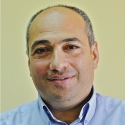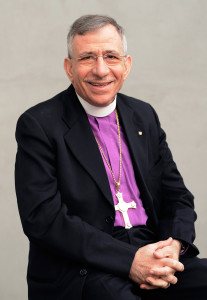ELCA NEWS SERVICE
June 26, 2013
ELCA works to provide relief to people internally displaced in Syria
CHICAGO (ELCA) — In response to the humanitarian crisis in Syria, the Evangelical Lutheran Church in America (ELCA) is providing more than $540,000 to the Syriac Orthodox Church to support its outreach to people displaced from their homes but remain in Syria because of the violent conflict. According to news reports, the conflict in Syria has claimed 100,000 lives since the fighting began in 2011.
Funds from ELCA Lutheran Disaster Response will provide for six-month’s worth of rent for 500 families, health services and supplies for children and infants, and support medical programs and surgeries.
On a recent trip to Chicago, His Eminence Archbishop Jean Kawak, patriarchal office director of the Syriac Orthodox Church in Damascus, discussed the effects of the fighting on the entire population of Syria, across all sectarian and ethnic divides.
“It is not only the Christian(s) who are harmed or affected by this situation. I’m scared about the entire Syria, but because we (Christians) are a minority in Syria, the minorities are usually more affected by a civil war or a problem like our Syrian problems,” said Kawak.
Although more than 1.5 million people have fled Syria and are seeking refuge in neighboring countries, there are an estimated 4.25 million Syrians who are internally displaced. According to the Rev. Robert O. Smith, the ELCA is one of the first churches in North America to provide aid to Syrians internally displaced from their homes.
“We started exploring what the Syriac church was doing to respond to the situation in Syria and then how the ELCA might be able to accompany them in that work,” said Smith, the ELCA’s area program director for the Middle East and North Africa. “It became apparent that the aid was not getting to the internally-displaced people,” said Smith.
Lutheran Disaster Responds funds will primarily support Christians in Syria, who have no other source of relief.
“Christians are the most vulnerable of all the vulnerable populations (in Syria), because they often can’t access the little aid that is available. In order to help the Christian population, the ELCA has to accompany churches in Syria, but the ELCA does not choose to work with only Christians,” said Smith.
Kawak explained that all communities in Syria are suffering from the violence that is spreading throughout the country, stressing that the church will not turn away anyone who needs assistance.
“I’m proud to say my nephew in Damascus asked me to help a Muslim family. The family was in a suburb of Damascus where it was attacked and destroyed,” said Kawak. “I told him let them come to me and I gave them money and medicine and many other things. And I’m really proud of him because he asked me to help a Muslim.”
“You see this is our life. And they tried many times to come and see me and say thank you. I told them you don’t have to thank me. This is my duty and I’m happy to do it. Please come always. We need each other; we need to be together. And we hope that everybody, the extremists from all sides, we need and we pray for them to understand that we have to respect they are human beings because they are human beings.”
Kawak said, “This is our mission to help everybody. This is an instrument of our Lord Jesus Christ. He told us to help everybody, regardless his color, his religion, his sect, his ethnic group. We need to do it and we are helping to do it.”
The ELCA also provides aid to Syrian refugees living in other countries and participates in humanitarian assistance in partnership with the Evangelical Lutheran Church in Jordan and the Holy Land, along with other Lutheran companion churches and partner organizations. Earlier this year, the ELCA provided $100,000 to support the needs of Syrian refugees at the Za’atri refugee camp in Jordan. The funds were sent to The Lutheran World Federation, which helps manage camp operations in cooperation with the Jordanian authorities.
The federation, which is managing the camp operations, is a global communion of 143 member churches in 79 countries worldwide. The ELCA is the communion’s only member church from the United States.
Text from ELCA News Service
 for Dr. Tawfiq Nasser who is undergoing surgery today at Stanford Hospital in Palo Alto. Dr. Nasser, CEO of Augusta Victoria Hospital (AVH) in Jerusalem has been instrumental in bringing remarkable improvements to the care, treatment and administration of AVH during challenging times.
for Dr. Tawfiq Nasser who is undergoing surgery today at Stanford Hospital in Palo Alto. Dr. Nasser, CEO of Augusta Victoria Hospital (AVH) in Jerusalem has been instrumental in bringing remarkable improvements to the care, treatment and administration of AVH during challenging times.
